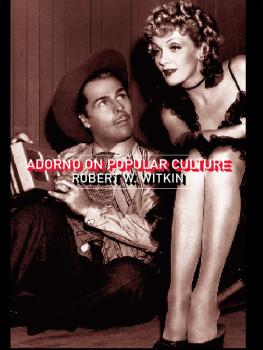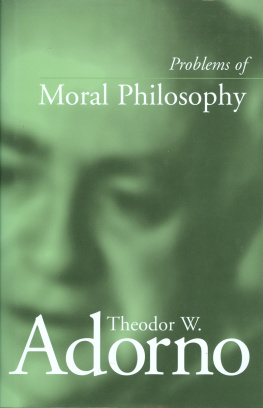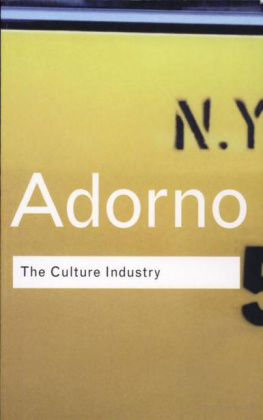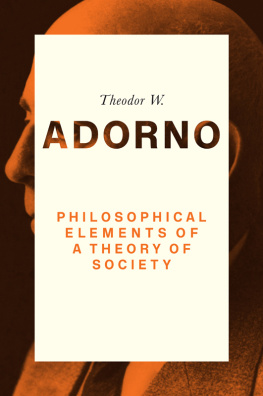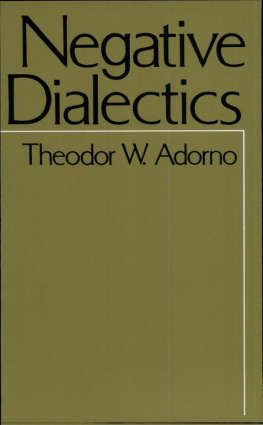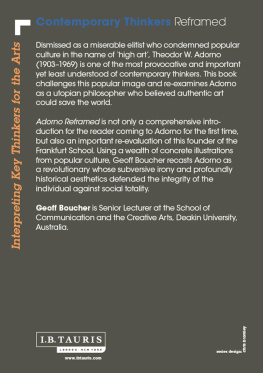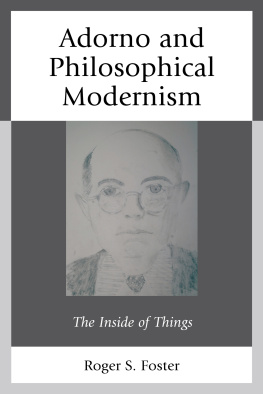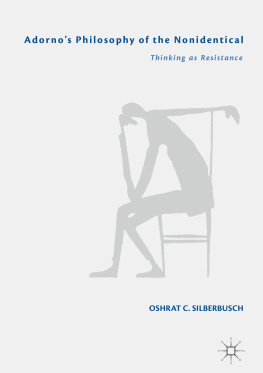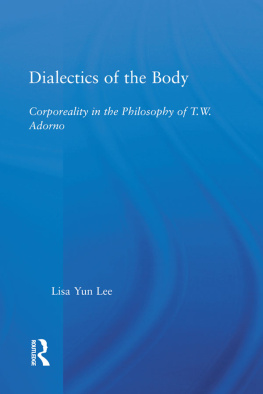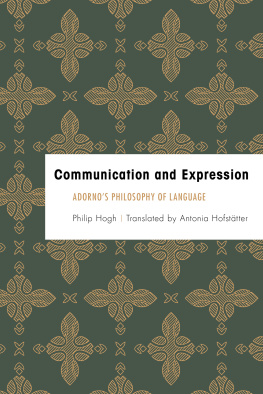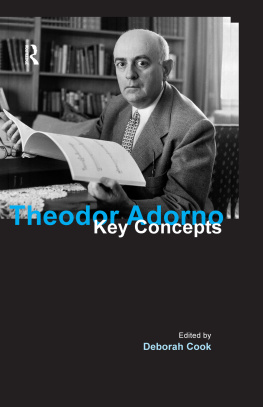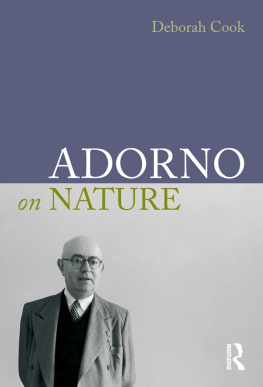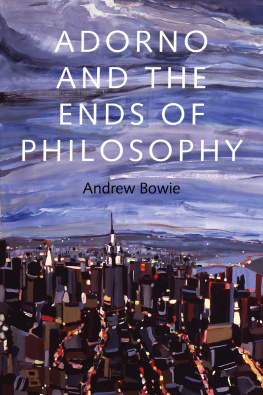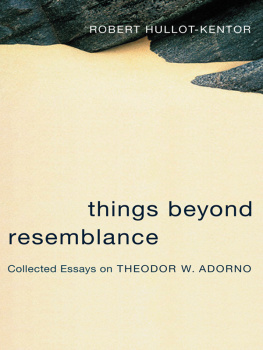For a list of titles published in the series, please see .
The Edinburgh Building, Cambridge CB2 8RU, UK
Cambridge University Press is part of the University of Cambridge.
It furthers the Universitys mission by disseminating knowledge in the pursuit of education, learning, and research at the highest international levels of excellence.
Published in the United States of America by Cambridge University Press, New York
www.cambridge.org
Information on this title: www.cambridge.org/9781107036543
Fabian Freyenhagen , 2013
This publication is in copyright. Subject to statutory exception and to the provisions of relevant collective licensing agreements, no reproduction of any part may take place without the written permission of Cambridge University Press.
First published 2013
Printed and bound in the United Kingdom by Clays, St Ives plc
A catalogue record for this publication is available from the British Library
Library of Congress Cataloguing in Publication data
Freyenhagen, Fabian.
Adornos practical philosophy : living less wrongly / Fabian Freyenhagen.
pages cm. (Modern European philosophy)
Includes bibliographical references.
ISBN 978-1-107-03654-3
1. Adorno, Theodor W., 19031969. 2. Ethics. I. Title.
B3199.A34F74 2013
193dc23
2012046972
ISBN 978-1-107-03654-3 Hardback
Cambridge University Press has no responsibility for the persistence or accuracy of URLs for external or third-party internet websites referred to in this publication, and does not guarantee that any content on such websites is, or will remain, accurate or appropriate.
Acknowledgements
In completing this project, I have been greatly assisted by both institutions and individuals, and I hereby want to express my deep gratitude.
First of all, my thanks extend to a number of institutions which have supported me financially during the completion of my PhD, a now distant predecessor to this book: the Arts & Humanities Research Council; the Studienstiftung des deutschen Volkes , the pension fund of the Nordeutscher Rundfunk (NDR) and the Bundesrentenanstalt fr Angestellte (BfA); and the University of Sheffield. I would also like to thank the Adorno-Archiv (and, in particular, Michael Schwarz) for granting me access to its treasures. Moreover, I would like to acknowledge gratefully the Senior Fellowship awarded by the Deutsche Forschungsgemeinschaft (DFG) project Justitia Amplificata (directed by Stefan Gosepath), hosted at the most congenial surroundings of the Forschungskolleg Humanwissenschaften in Bad Homburg during the Summer Term of 2010.
I owe an enormous debt to my two PhD supervisors, Bob Stern and Leif Wenar especially for their assistance during my studies at Sheffield, but also afterwards. In tandem, they gently pushed me forward, reassured me when I needed it, challenged me on every turn of the argument, and pointed me to many invaluable ideas and resources as well as contributing tirelessly to making my texts clearer and more accessible. I cannot thank them enough for all their endeavours. I would also like to express my gratitude to the Department of Philosophy at Sheffield for its stimulating and helpful environment, and in particular for the opportunity to teach a course on my PhD topic (and to the students of this course). Many others at Sheffield had a hand in the beginnings of the project let me particularly highlight Thom Brooks, Gerry Hough, David Liggins, and Doug Ryan. Conversations about Adorno with Gordon Finlayson date back to this time too and those about Kants practical philosophy with Jens Timmermann further back still I learned a great deal from both over the years.
At Essex, I have experienced a wonderfully supportive and intellectually rich environment. I have benefited greatly from discussing ideas and drafts with my colleagues Peter Dews, Timo Jtten, David McNeill, Patrice Maniglier, and Dan Watts, as well as various students and post-docs (such as Nick Joll). Batrice Han-Pile and Wayne Martin have contributed in a variety of invaluable ways as critical and constructive interlocutors in numerous discussions, in reading and commenting on drafts, as supportive Heads of Department/School, as mentors, as running partners (in Waynes case), and, last but certainly not least, as friends. Indeed, Wayne has also contributed in another capacity yet: as editor of the series in which this book appears (and a principled and thorough one at that!). In this context, I would also like to thank Hilary Gaskin and especially two anonymous referees, whose detailed and thoughtful reports have helped to improve this manuscript in many ways.
I count myself extremely fortunate to have a second intellectual home the Forschungskolloquium initiated some years back in Cambridge. Its co-members Raymond Geuss, Richard Raatzsch, Jrg Schaub, Christian Skirke, and, later on, Manuel Dries, Martin Eichler, Michael Hampe, Robin Celikates, and Lorna Finlayson patiently read, discussed, and forcefully criticised various drafts over the years as well as generally contributing to my Bildung in innumerable ways and being wonderful friends. (Raymond Geuss deserves special mention not just for all of the above and more, but also for working closely with me on editorial matters, helping me to turn the completed PhD a rather unwieldy beast of a text into something closer to a book manuscript.)
Moreover, my gratitude extends also to various other individuals (and audiences of talks), with whom I have discussed ideas and drafts. My recollection is incomplete, but let me at least mention Amy Allen, Kenneth Baynes, Seyla Benhabib, Jay Bernstein, James Bowman, Maeve Cooke, Rainer Forst, Katrin Flikschuh, Jane Heal, James Ingram, Hallvard Lillehammer, Alasdair MacIntyre, David Owen, Peter Niesen, Lubomira Radoilska, Martin Saar, Till van Rahden, Lea Ypi, and especially Rdiger Bittner, Axel Honneth, and Brian OConnor. There are many others who contributed more indirectly say by proofreading drafts (T. J. Day and Edward Pile), by introducing me to ideas and books (for example, Lothar Mller and Tim Nevill), or by going walking with me and being an amazing friend (Simon Schulz). Indeed, the dedication of this book is meant to be understood broadly to refer not just to those who taught me in formal, academic settings, but to all from whom I learned.


